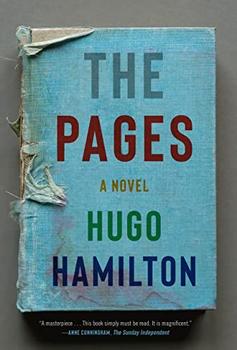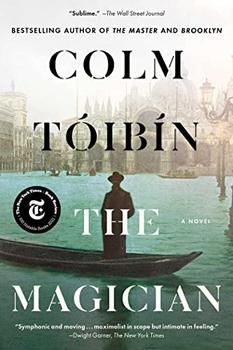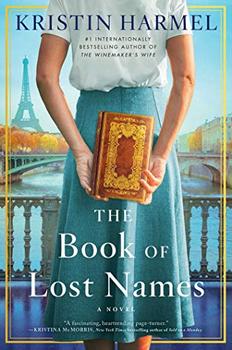Summary | Excerpt | Reviews | Beyond the book | Read-Alikes | Genres & Themes | Author Bio

A novel
by Hugo HamiltonHugo Hamilton's The Pages is itself narrated by a book, a copy of Joseph Roth's Rebellion that is rescued by a university professor from the Nazi regime's 1933 book burning in Berlin and passed on to one of his students, who in turn entrusts the safety of the text to his son, who subsequently takes it across the Atlantic to America with him, where it eventually ends up in the hands of the emigré's daughter, artist Lena Knecht. The novel opens with Lena en route to Berlin, determined to uncover the mystery of a map drawn in the back of her inherited book. Rebellion is going home.
On arrival in Berlin, Lena has her bag stolen — "This used to be the capital of book thieves" — and fears that her cherished copy of Roth's novel is gone forever. However, the thief thoughtlessly discards the book, thinking it worthless. The narrator describes lying "abandoned in the city of my birth" next to some "remains of a Vietnamese takeaway." The scene conveys both bathos and an evocation of cultures existing side by side. In keeping with this, the book is found by Chechen immigrant Armin, who senses its significance and tracks down Lena via a flier for an art exhibition inserted between the novel's pages. A relationship of kindred spirits is born, and Lena becomes increasingly embroiled in Armin's life. Threading this multi-layered story together is a thriller-type narrative — Armin's sister is being harangued and intimidated by her violent ex-boyfriend, who issues threats and ominously appears wherever she goes. This strand alone secures the reader's investment in the fate of these characters.
The voice of Rebellion is similar to that of the omniscient narrator, who gives the reader entry to Lena's situation. Living in New York but having spent part of her childhood in Ireland and possessing German roots, Lena is compelled to explore her heritage — and Rebellion is the means of accessing this missing part of her identity. The Pages embraces concepts such as survival (after all, Rebellion has survived a century of persecution and misfortune) and displacement. A sense of exile may help explain Lena's immediate connection with Armin but also her attachment to Rebellion — it bears witness to the past and suffers from it ("faint smoke inhalation from the night of burning books"); the book has become a link to Lena's own past. Displacement appears as a motif throughout The Pages, including through Lena's telephone conversations with her partner, Mike, back in America. These conversations often center around Mike's mother, who is the subject of a vilification campaign by her neighbors to hound her out of the home she has inhabited for many years. The message, it seems, is that displacement is inescapable and can manifest in many guises, from the individual to the global — ultimately, though, it is individuals who suffer the consequences at the hands of larger entities. The demonstration of this lends an almost Kafkaesque quality to this novel.
What is striking about The Pages is the interweaving of four different stories: that of Rebellion itself, and its experiences and observations since that fateful night in Berlin's Opera Square; the experiences of Joseph Roth, author of the salvaged novel; the story of a barrel-organ player, the protagonist of Rebellion; and the life of Lena — her relationships, her history, her close attachment to the book and her quest for answers. These four strands could easily result in confusion; instead, they create a fluidity and connectedness that is central to the overarching story, with Hamilton seamlessly orbiting their four respective worlds.
And what becomes clear is the power of the written word in ensuring the survival of diverse experiences — words record not only the past but are "part of a living chain of ideas reaching into the future." As a novel that has survived bibliocide and lived to tell myriad tales, this narrator knows what it's talking about.
![]() This review
first ran in the February 16, 2022
issue of BookBrowse Recommends.
This review
first ran in the February 16, 2022
issue of BookBrowse Recommends.

If you liked The Pages, try these:

by Colm Toibin
Published 2022
From one of today's most brilliant and beloved novelists, a dazzling, epic family saga centered on the life of Nobel laureate Thomas Mann, spanning a half-century including World War I, the rise of Hitler, World War II, and the Cold War.

by Kristin Harmel
Published 2021
Inspired by an astonishing true story from World War II, a young woman with a talent for forgery helps hundreds of Jewish children flee the Nazis in this unforgettable historical novel from the New York Times bestselling author of the "epic and heart-wrenching World War II tale" (Alyson Noel, #1 New York Times bestselling author) The Winemaker's ...
Discovery consists of seeing what everybody has seen and thinking what nobody has thought.
Click Here to find out who said this, as well as discovering other famous literary quotes!
Your guide toexceptional books
BookBrowse seeks out and recommends the best in contemporary fiction and nonfiction—books that not only engage and entertain but also deepen our understanding of ourselves and the world around us.